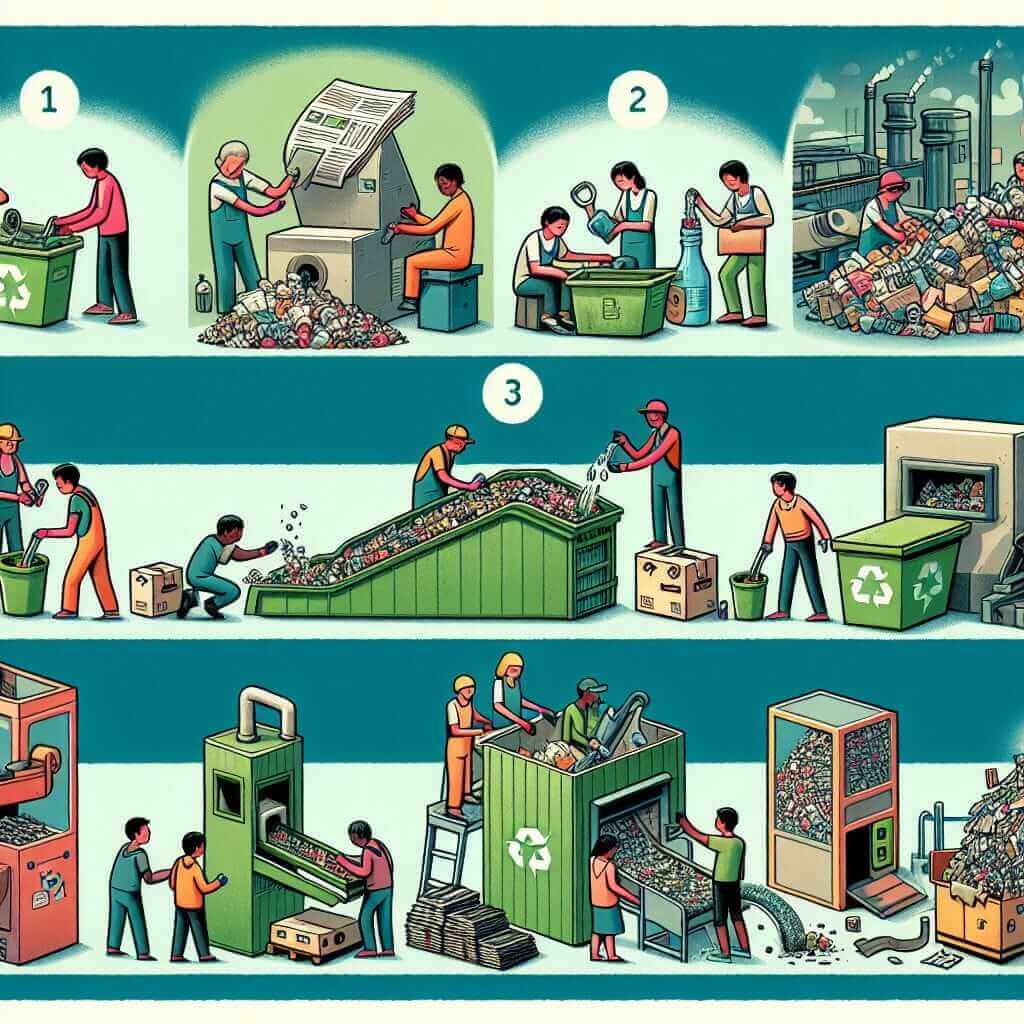“The importance of recycling in waste management” is a topic that frequently appears in the IELTS Writing Task 2 exam. This essay will delve into the significance of recycling, analyze a sample question, and provide a model answer to help you excel in your IELTS writing.
Nội dung bài viết
Sample IELTS Writing Task 2 Questions
Here are some examples of how this topic might be presented in the exam:
- Some people believe that recycling is the most important action individuals can take to protect the environment. Others argue that there are more effective methods, such as reducing consumption. Discuss both views and give your own opinion.
- The increase in global consumption has led to an unprecedented rise in waste. To what extent do you agree or disagree that recycling is the best solution to this problem?
- Many governments are investing heavily in promoting recycling initiatives. However, some argue that these resources would be better spent on developing alternative methods of waste disposal. What is your opinion?
Model Answer and Analysis
Let’s choose the first question to analyze and provide a model answer for:
Some people believe that recycling is the most important action individuals can take to protect the environment. Others argue that there are more effective methods, such as reducing consumption. Discuss both views and give your own opinion.
Analysis:
- Type: Opinion essay (discuss both views and give your opinion)
- Key terms: recycling, protect the environment, effective methods, reducing consumption
Model Answer:
The increasing amount of waste generated by modern societies has sparked debate over the most effective ways to mitigate its environmental impact. While some advocate for recycling as the primary solution, others argue that reducing consumption is paramount. This essay will examine both perspectives before presenting a balanced viewpoint.
Proponents of recycling highlight its crucial role in conserving natural resources. By reprocessing materials such as paper, glass, and plastic, we lessen the demand for virgin resources, which often require energy-intensive extraction and manufacturing processes. This, in turn, reduces deforestation, habitat destruction, and greenhouse gas emissions associated with resource extraction. Moreover, recycling diminishes the volume of waste sent to landfills, thereby minimizing land pollution and associated health hazards.

However, critics argue that focusing solely on recycling might foster a false sense of security. They contend that the true solution lies in tackling the root cause of the problem: overconsumption. By reducing our reliance on disposable products, adopting a minimalist lifestyle, and supporting sustainable production practices, we can substantially decrease the amount of waste generated in the first place. This approach, they argue, offers a more profound and lasting impact on environmental protection.
In conclusion, while recycling undoubtedly plays a vital role in waste management and environmental conservation, it should not be seen as a standalone solution. A holistic approach that emphasizes both responsible consumption patterns and efficient recycling systems is essential to effectively address the challenges posed by waste in the 21st century. Ultimately, promoting a cultural shift towards mindful consumption holds the key to achieving long-term environmental sustainability.
(Word count: 277 words)
Notes on the Model Answer:
- Structure: The essay follows a clear structure, addressing both sides of the argument and providing a well-reasoned opinion.
- Vocabulary: The essay utilizes a range of vocabulary related to the environment and waste management (e.g., mitigate, environmental impact, conserving natural resources, energy-intensive, deforestation, habitat destruction, landfill, disposable products, sustainable production, mindful consumption).
- Grammar: The essay demonstrates a good command of complex sentence structures and grammatical accuracy.
- Coherence and Cohesion: The ideas are logically connected using appropriate linking words and phrases (e.g., while, however, moreover, in turn, thereby, in conclusion, ultimately).
Vocabulary Highlights:
- Mitigate (verb): /ˈmɪt.ɪ.ɡeɪt/ – to make something less harmful, serious, or unpleasant.
- Paramount (adjective): /ˈpær.ə.maʊnt/ – more important than anything else.
- Conserving (verb): /kənˈsɝːv/ – to protect something from being lost or wasted.
- Energy-intensive (adjective): /ˈen.ɚ.dʒi.ɪnˌten.sɪv/ – requiring a large amount of energy to produce or operate.
- Deforestation (noun): /ˌdiːˌfɔːr.əˈsteɪ.ʃən/ – the action of clearing a wide area of trees.
- Habitat destruction (noun): /ˈhæb.ɪ.tæt dɪˌstrʌk.ʃən/ – the process of damaging or destroying the natural environment where a particular type of plant or animal lives.
- Landfill (noun): /ˈlænd.fɪl/ – a place where garbage is buried.
- Disposable (adjective): /dɪˈspoʊ.zə.bəl/ – made to be thrown away after use.
- Sustainable (adjective): /səˈsteɪ.nə.bəl/ – able to continue over a period of time.
- Mindful consumption (noun): /ˈmaɪnd.fəl kənˈsʌmp.ʃən/ – the practice of being aware of the environmental and social impacts of our purchases and making conscious decisions about what we buy and how we use it.
Conclusion
This guide provides a comprehensive analysis of “The importance of recycling in waste management” for IELTS Writing Task 2. Remember to analyze the question carefully, structure your essay logically, use relevant vocabulary, and demonstrate a strong command of grammar. By practicing these skills and studying the provided model answer, you can improve your writing proficiency and achieve your desired IELTS band score. Other similar topics related to waste management and environmental protection that you may encounter include:
- The role of technology in waste reduction
- The impact of plastic pollution
- The importance of environmental education
- The responsibility of businesses in environmental sustainability
- The effectiveness of government policies on waste management